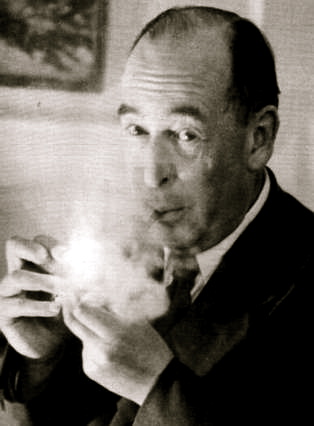Sunday, September 4, 2011
C. S. Lewis on C. S. Lewis
"I was a younger son, and we lost my mother when I was a child. That meant very long days alone when my father was at work and my brother at boarding school. Alone in a big house full of books. I suppose that fixed a literary bent. I drew a lot, but soon began to write more. My first stories were mostly about mice (influence of Beatrix Potter), but mice usually in armor killing gigantic cats (influence of fairy stories). That is, I wrote the books I should have liked to read if only I could have gotten them. That's always been my reason for writing. People won't write the books I want, so I have to do it myself: no rot about 'self-expression.' I loathed school. Being an infantry soldier in the last war would have been nicer if one had known one was going to survive. I was wounded--by an English shell. (Hence the greetings of an aunt who said, with obvious relief, 'Oh, so that's why you were wounded in the back!') I gave up Christianity at about fourteen. Came back to it when going on for thirty. An almost purely philosophical conversion. I didn't want to. I'm not the religious type. I want to be let alone, to feel I'm my own master: but since the facts seemed to be the opposite I had to give in. My happiest hours are spent with three or four old friends in old clothes tramping together and putting up in small pubs--or else sitting up till the small hours in someone's college rooms talking nonsense, poetry, theology, metaphysics over beer, tea, and pipes. There's no sound I like better than adult male laughter."
(A brief autobiographical sketch composed for his American publisher, 1944)
Saturday, September 3, 2011
The Tobolowsky Files: A Beginner's Guide
One of the great discoveries of the summer for me has been The Tobolowsky Files, a (roughly) bi-weekly podcast of "stories about life, love, and the entertainment industry as told by character actor Stephen Tobolowsky." I can say with equal certainty that you probably don't know that name, and you probably know this face:

His credits include Groundhog Day (as insurance salesman Ned Ryerson), Memento (as the cautionary character Sammy Jankis), and Mississippi Burning (as KKK head Clayton Townley). You've seen him in something. In addition (and more relevantly to this post), he's one of the best storytellers I've ever heard. His stories are moving, well-written, and occasionally hilarious, and they're (perhaps more importantly) conscious reflections on the human experience: youth, heartbreak, success, regret, marriage, parenthood, aging, hoping. I think they're wonderful. For the even mildly intrigued, here are some of my favorites:
Episode 4: "The Alchemist" - Stephen explores his most vivid memories of his mother and wonders why those memories, and not others, stuck.
Episode 22: "The Dangerous Animals Club" - Young Stephen and a neighbor boy try to catch every potentially lethal animal in Texas.
Episodes 26-28: "Dark Matter," "Three Honeymoons," and "The Afflictions of Love" - For those ready for a greater commitment, a trilogy of stories about Stephen's marriage to Ann.
Episode 34: "A Good Day at Auschwitz" - An elderly man at Stephen's synagogue is a survivor of Germany's invasion of Poland and, later, multiple death camps.
Episode 39: "Contagion" - Conspiracy and racism on the set of Mississippi Burning.
Thursday, September 1, 2011
Deep greens and blues are the colors I choose.
If you were to contend in my presence that James Taylor has written some hokey songs, you'd get no protest from me. But if you were to further argue that he's never written anything awesome (and for some reason you were unpersuaded by "Fire and Rain," whose only defect that I can discern is its overfamiliarity), I think this is the song to which I'd force you to listen. It's got all the elements of good music: acoustic guitar, a catchy chorus, and a cowboy.
Subscribe to:
Comments (Atom)




